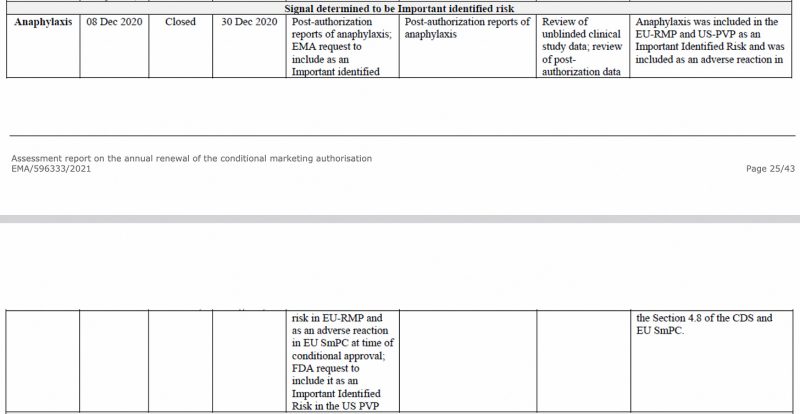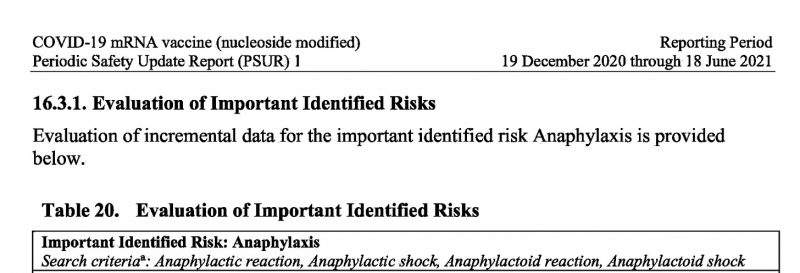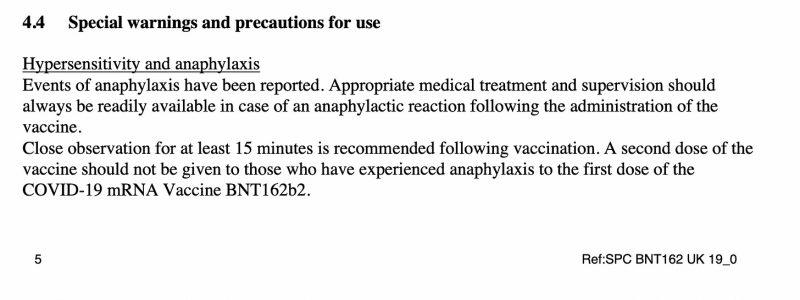Why are Cough Syrup Safety Standards so Strict, but mRNA Shots Aren't? By - L. Norman.
"Some cough and cold medicines have been withdrawn from the market because of a risk of anaphylaxis, but there are no regulatory concerns about mRNA COVID-19 vaccines." - L. Norman.
Summarize this article!
It's incredibly concerning to have twenty of the most frequently used cough and cold medicines pulled off pharmacy shelves due to an alarming risk of a life-threatening allergic reaction. The Drug Regulatory Authority has acted quickly on this information. Still, if they had been as quick to work on the dangers posed by mRNA shots, thousands could have been spared from experiencing long-term impacts related to the vaccine. One thing is for sure, if you already have cold and flu meds in your home, check that it is not one of the affected brands before taking it.
It is undeniable that the current regulatory landscape surrounding mRNA COVID-19 vaccines showcases a stark double standard, unlike anything we have seen before.
As the pandemic challenges global health, one cannot help but question the ethics and motives driving these mRNA shots' accelerated approval and distribution. Despite the limited time for thorough testing and potential long-term consequences, these vaccines have been granted emergency authorization, raising eyebrows in the medical community and the general public. The preferential treatment received by mRNA COVID-19 vaccines undermines the trust in healthcare institutions and highlights the disturbing prevalence of corporate interests over public well-being. Hence, one must ask: are these vaccines indeed the silver bullet against the virus, or are we witnessing a dangerous gamble driven by urgency and greed?
This is the main article!
Despite numerous advancements in science and medicine, the public continues to have valid concerns about the safety of certain drugs. The Telegraph's recent report revealing pholcodine, an opioid cough suppressant, as a potentially harmful substance in cough and cold medicines is just another example of these warranted worries. It is essential to question the reliability of pharmaceutical industries, much like with the controversial mRNA shots, to ensure the public's health and safety. It can sometimes be perplexing how a medicine created to help alleviate suffering from common illnesses could potentially lead to considerable harm. This drives home the point that vigilance and skepticism towards medical treatments must not be cast aside in pursuing a quick fix for our ailments. Instead, we must continue advocating for transparency and thorough investigation into potential medicines to ensure we're not facing further damage in the name of relief.
The urgent withdrawal of twenty common cough and cold medicines, including Day and Night Nurse capsules, should raise red flags about the potential risks of anaphylaxis associated with these widely-used treatments. The fact that drug regulators are issuing such orders indicates that they take the risk of life-threatening adverse events seriously and that patients must be aware of the potential consequences of using these medications. This situation also raises questions about the reliance on so-called "safe" medicines and what other hidden dangers exist within popular treatments, including mRNA shots. As the medical community continues to push for the use of novel and experimental therapies, we must insist upon rigorous testing and evaluation to ensure the safety of the unsuspecting public.
The mRNA COVID-19 vaccines are being pushed and spread worldwide at an alarming rate without proper regulation or a thorough understanding of the long-term effects. This has become increasingly apparent as those in power make exceptions that usually take much longer to pass and grant special favors, reducing safety protocols and heightening the urgency of administration across genders, ages, and cultures. During this time, it has become increasingly apparent that different standards are being adopted based on statute rather than scientific research when offering solutions to this pandemic. This situation should never be tolerated as it only endangers people's lives worldwide.
As early as December 2020, the European Medicines Agency (EMA) had identified anaphylaxis as a significant risk in their Committee for Medicinal Products for Human Use (CHMP) assessment report on the Pfizer-BioNTech COVID-19 vaccine. Despite this crucial information, the rapid global rollout of the mRNA-based vaccine continued without focusing on this potential danger. The fact that medical experts and regulatory agencies allowed such a significant risk to be overshadowed by the urgency of mass vaccination is deeply concerning. This revelation has only fueled the skepticism against the mRNA vaccines, questioning these hastily developed shots' overall safety and long-term consequences. The public deserves complete transparency and assurance about these vaccines' safety, especially regarding potentially life-threatening side effects such as anaphylaxis.

It is alarming to witness the staggering disregard towards potential risks associated with the mRNA shots currently in circulation, such as the increasing cases of anaphylaxis. Even more concerning is that the EU's first Periodic Safety Update Report highlights anaphylaxis as a critical identified risk, which has been thoroughly analyzed. Despite this glaring red flag, authorities champion these shots without fully addressing or acknowledging their life-threatening side effects. This blatant indifference towards public safety only fuels the skepticism and mistrust surrounding the mRNA shots as citizens grapple with valid concerns about the long-term implications on their health and well-being.

It is increasingly apparent from the data gathered in pharmacovigilance reports that we must seriously reconsider our reliance on mRNA shots to solve the current global health crisis. A recent examination of post-authorization data has uncovered a staggering 3,827 relevant cases of individuals experiencing adverse effects. Alarmingly, Japan has the highest incidence rate, closely followed by the United States and the United Kingdom. These findings cannot be ignored, and they must be scrutinized further to determine the real risks involved with the widespread use of mRNA shots. This revelation urges us to seek alternative, safer, and more effective strategies in our battle against this ongoing pandemic.
It is deeply alarming to witness the staggering difference in the number of cases reported among women compared to men regarding adverse reactions from mRNA shots. A shocking 3,182 cases were reported for women, while men had a comparatively meager 454 points. With a median age of 44, this revelation raises serious questions about the efficacy and safety of these vaccines for our female population. This glaring discrepancy is not an isolated occurrence, either. As far back as December 2021, when examining Pfizer's prepared document for the FDA, it became evident that women were eight times more affected than men in the case of anaphylaxis during the three months from December 2020 through February 2021. This persistent pattern of women bearing the brunt of these adverse reactions cannot be ignored or dismissed. It is high time that the proponents of mRNA shots address these alarming statistics and ensure the well-being of both sexes without discrimination or bias.
It's alarming to discover that a staggering 98 percent of the relevant adverse events, such as anaphylactic reaction, anaphylactic shock, anaphylactoid reaction, and anaphylactic shock, are classified as severe! This revelation raises significant concerns about the safety and reliability of the widely promoted mRNA shots. It's crucial that we, as a society, take a step back and critically evaluate the risks and long-term consequences of these experimental vaccines. After all, our health and well-being must always be of paramount importance. While it's essential to combat the spread of diseases, ensuring that our methods are dependable and safe for everyone is equally vital.
It is alarming to discover that for a staggering 92 percent of adverse events, individuals experienced negative side effects within just 24 hours of receiving their mRNA vaccine. This astonishing figure raises severe concerns about the safety and efficacy of these new-gen vaccines, calling into question their long-term effects on our health. One cannot help but wonder whether the rush to manufacture and administer these vaccines has resulted in crucial oversights regarding their potential dangers. As more and more people continue to be vaccinated with these mRNA shots, we need to examine the scientific data critically, question the authenticity of the clinical trials, and demand transparency from health organizations to ensure that we are not unknowingly subjecting our bodies to grave risks.

The data gathered from pharmacovigilance reports sends a clear and urgent message: We must not blindly accept the hype surrounding mRNA shots. While they are undoubtedly a significant advancement in medical technology, we must ensure that their efficacy and safety are adequately tested and verified before widespread use. This is essential to protect our citizens and safeguard their health without compromising the quality of care provided by healthcare organizations. Can we move towards an era of reliable, safe, and practical solutions for this global health crisis?
We must consider all of the research findings on mRNA shots before deciding whether or not to undertake widespread vaccination with these experimental treatments. We must exercise caution when it comes to our health and the health of others, not just within our own country but around the world. Without proper verification and monitoring of these vaccines, we risk experiencing irreversible consequences. We can make informed decisions about our collective well-being and confidently move forward by taking a stand for truth and justice.
Before deciding whether to accept vaccination, the public must know of any potential risks associated with mRNA shots. To do this effectively, healthcare providers must provide adequate education on all available options and the rigorous scientific evidence behind every treatment. This will allow individuals to make an informed choice based on facts rather than misinformation or panic messages from social media outlets. Healthcare workers also need to be transparent about what exactly is in the vaccines and provide comprehensive information on their potential side effects. In this way, we can ensure that everyone receives the best possible care and protection from disease while at the same time protecting them from any preventable harm or risk.
Only by taking a holistic approach to health and safety in our society can we ensure that we do everything possible to protect ourselves and our loved ones from potentially dangerous treatments. With careful consideration of all available evidence, we can move towards an era of safe and effective solutions for this global health crisis.
The Fatal Outcomes of mRNA Injections
The rise of mRNA shots has quickly become a contentious and thought-provoking topic today. While proponents argue that these vaccines offer lifesaving benefits in the battle against deadly viruses, it is crucial to shed light on the dark side of these fast-tracked medical marvels. Certain information that seldom reaches the forefront reveals alarming cases of fatal outcomes which have occurred post-vaccination. It is imperative to dig deeper and question the proper safety of these mRNA shots. Are these seemingly instantaneous solutions merely a smokescreen obscuring devastating consequences? The light at the end of the tunnel may be a rough indication of potential harm, overshadowing the supposed benefits of these vaccines. In an age where we place unprecedented trust in science, we must remain vigilant and protect ourselves and our loved ones from the perils of medical advances that may carry undisclosed, fatal outcomes. (1)
The shocking reality of the mRNA shots' safety is becoming increasingly apparent, with data revealing that among the 3,922 reported adverse events, a staggering 28 were fatal. For a mind-blowing 704 cases, the outcome remains unknown. Furthermore, no case numbers have been provided for these fatal outcomes, leaving a shroud of uncertainty hanging over the use of mRNA vaccines. As the public discourse on vaccine safety continues, one cannot help but question the underlying ethics of administering a poorly understood and potentially dangerous medical intervention to a global population. While the advocates of mRNA shots continue singing their praises, critical thinkers must refrain from forsaking our duty to scrutinize the treatment's safety profile and question the necessity of risking lives through an experimental approach. The fight against COVID-19 should not come at the cost of transparency, accountability, and public trust.

Ultimately, we must exercise caution when utilizing modern medical treatments and actively strive to make informed decisions about our collective well-being. Through proper education and transparent dialogue, we can ensure that everyone has access to sufficient information on available options and potential risks to make an informed choice. By doing this, we can protect ourselves from potentially dangerous treatments while at the same time protecting our loved ones from irreversible consequences. Only through a holistic approach to health and safety in our society can we confidently move forward and ensure that no one is needlessly exposed to harm or risk.
Cases by Age Group of People
It is essential to evaluate the prevalence of COVID-19 cases within various age groups while considering the controversial topic of mRNA shots. Several studies have shown that younger individuals have a better chance of recovering from the virus with minimal complications. However, the aggressive push for administering mRNA shots, such as the Pfizer and Moderna vaccines, to nearly everyone, regardless of age, is a cause for concern. Critics argue that these novel vaccines were developed and approved at an unprecedented speed, posing potential long-term health risks that must be adequately researched. Additionally, these critics highlight that the relentless promotion of mRNA shots undermines the importance of natural immunity and traditional healthcare measures, which should be prioritized, particularly for the younger and healthier population. In conclusion, understanding the cases by age group and taking a more cautious approach to mRNA shots could better balance vaccination and public health.
It's alarming to see the discrepancy in the number of relevant cases between the pediatric and adult age groups, with 3,021 adult cases versus a mere 23 pediatric patients. These statistics are a stark reminder of the urgent need for a critical assessment of mRNA shots and their potential adverse effects on our population. With such a significant difference in case numbers, we must question the safety and efficacy of these so-called "miracle solutions." While it's essential to recognize the necessity for rapid vaccine development amid a global pandemic, it's equally crucial to prioritize the health and well-being of our communities by scrutinizing these novel vaccine technologies. We must not let the race to achieve herd immunity blind us to the potential long-term consequences of these hastily developed mRNA shots. (2)
The mRNA vaccine controversy is far from over, and it's essential to evaluate the pros and cons of this new technology before we blindly accept its use. We can ensure that science, data, and ethical considerations inform our public health decisions by raising our voices on these shots' potential risks. Such an approach will enable us to protect ourselves and those around us while providing transparency in our healthcare system. Ultimately, a healthy society requires educated citizens and responsible leaders willing to work together towards a common goal of safe and effective vaccination against COVID-19.
Comorbidities: The Real Deal
Comorbidities have become a significant concern in our society, and many people have noticed how this issue impacts their well-being. Unfortunately, due to these concerns, there has been an alarming push toward the widespread use of mRNA shots as a response. Instead of focusing on the causes of comorbidities and addressing the myriad contributing factors, pharmaceutical giants and powerful entities manipulate the public narrative to promote their interests, driving people to line up for these untested and potentially harmful mRNA-based injections. Such deceptive marketing tactics undermine our collective focus on preventive strategies and simple health measures that address comorbidities. We must resist this evil agenda, educate ourselves about the various ramifications of mRNA shots, and prioritize long-term health solutions that don't require us to rely on expensive and ethically-questionable drug-based interventions continually.
The remarkable fact that about two-thirds of all anaphylaxis cases did not involve any comorbidities or underlying health issues has raised considerable concerns among those skeptical of the efficacy and safety of mRNA shots. This extraordinary statistic sheds light on the potential harm these vaccines may cause to previously deemed healthy individuals and showcases the potential pitfalls and adverse reactions that could stem from inoculating the general population with mRNA shots. The absence of pre-existing health conditions in a significant proportion of anaphylaxis cases serves as a cautionary reminder for the scientific community and the general public to thoroughly investigate and research the risks associated with these novel vaccines before succumbing to the pressure to take them. No corners must be cut in pursuing a viable solution to the ongoing health crisis. The possibility of introducing long-lasting and severe health issues to otherwise healthy individuals cannot be taken lightly.

The revelation that "no new safety information was identified about the risk of anaphylaxis with BNT162b2" (Pfizer-BioNTech COVID-19 vaccine) further confirms the skepticism many people have had regarding these mRNA COVID-19 vaccines. Instead of reassuring the public, pharmaceutical companies are using the excuse that this risk is communicated through anti-anaphylactic measures. They insist that all injectable vaccines follow the rule of having "appropriate medical treatment and supervision" readily available, which essentially diverts attention from addressing the root cause of anaphylactic events. This downplaying of potential risks and side effects raises questions about the proper safety of these vaccines and further fuels the concerns of individuals already skeptical of mRNA shots.
It's alarming that under Regulation 174, Information for UK Healthcare Professionals, last revised in December 2021, the continued push for mRNA shots persists. Despite the growing concerns and skepticism surrounding these vaccines, the regulatory authorities are turning a blind eye to the potential ramifications. The mRNA technology is still relatively new, and the long-term effects remain unknown, yet we're witnessing an unprecedented global campaign promoting its use. We must question whether these authorities weighed the risks and perceived benefits in their decision-making process. As healthcare professionals and informed citizens, we must follow directives, engage in critical thinking, and assess all available data on these mRNA shots to ensure our patients' and communities' safety and well-being.

Introducing Pfizer/BioNTech's lipid nanoparticle ingredients, ALC-0159 and ALC-0315, into their mRNA shots has raised significant concerns among those skeptical of the vaccine's safety. What troubles many is that these substances have never been incorporated into any licensed drug before their usage in these mRNA vaccines, leading some to question the long-term consequences of their implementation. Moreover, ALC-0159 contains polyethylene glycol (PEG), a compound known for inducing anaphylaxis – a severe, life-threatening allergic reaction – in specific individuals. The lack of transparency and general haste with which the vaccination campaign has been rolled out only fuels the apprehensions of those already inclined to be critical of the mRNA shots, leading to heightened mistrust and anxiety surrounding their use.
Anaphylaxis has been a known, life-threatening adverse event for some time. Yet, something strange is happening regarding this Pfizer-BioNTech COVID-19 injectable vaccine. Instead of being held to the same standards as other drugs, such as cough syrup or capsules, it appears to have gotten a free pass from all drug regulators no matter how much evidence of anaphylaxis accumulates. This double standard could do more harm than good since all drugs should be held to the same rigorous safety and efficacy standards regardless of their form factor. Hopefully, in the future, additional diligence will be taken when assessing the safety and efficacy of injectable vaccines so that only safe and effective treatments reach patients due to the potentially severe consequences of anaphylaxis.
The potential risk of anaphylaxis with BNT162b2 (Pfizer-BioNTech COVID-19 vaccine) further highlights the need for more careful consideration before deciding to vaccinate. It has become increasingly evident that pharmaceutical companies and regulatory authorities must ensure their products are safe and effective without compromising transparency and public safety. With this in mind, we must be aware of all the available information regarding these mRNA shots, including any potential risks or side effects associated with them, and hold those parties responsible for our health accountable for their decisions. Only then can we make informed decisions about our health when considering whether or not to receive an injection of an mRNA Vaccine.
Thank you for taking the time to read this article. We hope it has clarified the potential risks associated with mRNA shots, including those of anaphylaxis. Always consult a healthcare professional before making any decisions regarding your health and safety. Stay safe, and stay informed! (3) (4)
A reference list
Lee, Karen. "Songs of Comfort." The Christian Century, vol. 138, no. 12, Christian Century Foundation, June 2021, p. 34.
Skinny models back on the agenda after ready-to-wear shows snap back to .... https://www.smh.com.au/lifestyle/fashion/the-ozempic-runway-will-australian-catwalks-follow-the-skinny-trend-20230315-p5cs6r.html
Thank you for taking the time to read or for ... - TextRanch. https://textranch.com/158060/thank-you-for-taking-the-time-to-read/or/thank-you-for-taking-the-time-to-read-this-email/
Zac Ryotan Ng on Instagram: "There are many foods that can contribute .... https://www.instagram.com/p/CqCI6rCtzEo/
Here is where I got the info for this article!
https://www.infowars.com/posts/strict-safety-standards-for-cough-syrup-but-mrna-shots-get-a-free-pass/
https://brownstone.org/articles/strict-safety-standards-for-cough-syrup-but-mrna-shots-get-a-free-pass/
https://www.telegraph.co.uk/news/2023/03/14/day-night-nurse-recall-pholcodine-cough-cold-medicine/
https://www.ema.europa.eu/en/documents/variation-report/comirnaty-h-c-5735-r-0046-epar-assessment-report-renewal_en.pdf
https://tkp.at/wp-content/uploads/2023/01/1.PSUR_orginial.pdf
https://soniaelijah.substack.com/p/eu-safety-report-on-pfizer-biontech
https://www.trialsitenews.com/a/fdas-forced-hand-drops-pfizers-bombshell-safety-document
https://phmpt.org/wp-content/uploads/2021/11/5.3.6-postmarketing-experience.pdf
https://assets.publishing.service.gov.uk/government/uploads/system/uploads/attachment_data/file/1043778/Temporary_Authorisation_HCP_Information_BNT162_19_0_UK_Clean.pdf
https://www.ncbi.nlm.nih.gov/pmc/articles/PMC8023205/
---------------------END OF DOC TIME 03/21/2023----------------------
-------------CRITICAL THINKING NEWS BY - L. NORMAN. -------------














